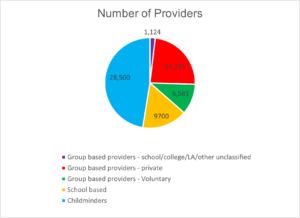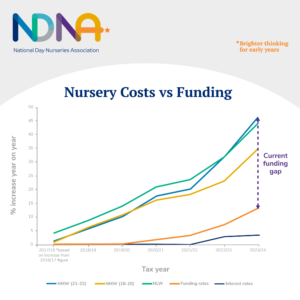Official reports show pressure building on early years providers
New statistics released by DfE and Ofsted on the Early Years sector this reveal that recruitment and retention crisis remains prevalent while nurseries remain determined to keeping rising costs away from parents and support their children.
The Department for Education’s annual Childcare and Early Years Provider Survey 2022 gives insights into childcare and early years provision in England and the challenges providers are facing.

Make-up of the Early Years sector
The make-up of the sector was revealed to be:
- 21,900 group based providers (14,191 private providers and 6581 voluntary providers)
- 9,700 school based providers
- 28,500 childminders
Group based providers delivered over 1 million of the 1.57m places across England, with each provider having an average of 55 places (private) and 35 (voluntary). As confidence returned following the pandemic, half of providers had higher occupancy than the previous year.
Soaring inflation and expenses has forced fees to rise, although below the rate of inflation. Private providers’ fees for 3 and 4 year olds have increased on average by 3.2% between 2021 and 2022.
In terms of staffing:
- The percentage of group based providers using temporary staff increase from 27% to 30%; those using apprentices increased from 40% to 49%; and those using volunteers rose from 24% to 34%.
- A third more staff joined than left but turnover rates for private providers were at 20%
- In group based providers, 80% of staff were qualified to level 3 or above, while 11% were qualified up to level 6 (34% in school based) – these figures exclude apprentices
Financially, staffing costs continue to make up a large proportion of group based providers’ costs (76%), with mortgage and rent next (9%). Furthermore, 95% of private providers are now registered for Tax Free Childcare, but only 30% of their registered children used the scheme.

Funding gap: nursery staffing costs and interest rates vs Government funding rates
83% of group based care for at least one child with SEND. Both group and school based providers had an average of 5 children per setting with SEND. This represented 11% of registered places for group based settings. 97% of groups had a SENCO in place.
Purnima Tanuku OBE, Chief Executive of National Day Nurseries Association (NDNA) said: “The new provider statistics show how crucial the private and voluntary nursery sector is in delivering early education and childcare places across England.
“The data demonstrates that nurseries are trying hard to keep unavoidable fee increases under control. Although fees have risen it’s been by a below-inflation average of 3.2% for three and four-year-olds.
“With wage bills making up 76% of total costs for nurseries, the 10% increase in minimum wages in April will hit providers extremely hard. The new funding rates must take this and other soaring costs such as food and energy into consideration.
“As a country we currently invest less per child than Estonia and Slovenia. As the funding gap grows between costs and what the Government are prepared to pay then providers and families will continue to pay the price.”
Ofsted’s latest annual report has stated that staff shortages are having an impact on the sector and are ‘compounding’ problems for children’s early years education and must be urgently addressed.
This staffing crisis is exacerbated by staff leaving for better paid jobs, and are forcing nurseries to close. The rise in apprenticeships noted by the Provider Survey, according to Ofsted, may provide a solution to some staffing issues, although there has been a large fall in the numbers of people starting these apprenticeships. This reliance is having “a knock-on impact on the quality of their early education”.
• 96% of nurseries/pre-schools were rated ‘Good’ or ‘Outstanding’; 79% of those judged this year were ‘Good’ or ‘Outstanding’
• Many children have fallen behind with longer term challenges, such as speech and language delays and a negative impact on PSED
To make up for this, providers were focussing on gaps in learning and helping to catch them up. Ofsted claimed that providers must “priorities curriculum planning and decided what children need to learn before planning activities”.
A decline in providers, hinted at in the last quarterly stats, also show also a decline in places that is moving in line with decreasing birth rates.
Mrs Tanuku continued, saying: “We are so proud that despite all the challenges nurseries are facing in terms of the funding gap and more children presenting with additional needs, 96% are still judged as good or outstanding which is amazing.
“The recruitment and retention crisis in early years is something we have been warning the Government about for a long time and yet they haven’t made any steps towards supporting the sector to resolve it.
“Ofsted inspectors are still not recognising the huge strain that nurseries are under when carrying out their inspections, and we know there is an inconsistency in terms of providers’ experiences of the quality of inspections. The complaints and appeals process for providers is woeful and not fit for purpose. These needs addressing urgently.”
- England
- Department for Education
- Ofsted
- Staffing
- tax free childcare
- Wages
Similar Articles
New research shows early maths intervention gives children sustained progress

Stephen Morgan MP officially Early Education minister

